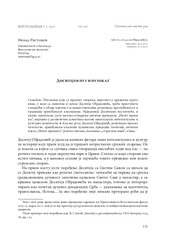Приказ основних података о документу
Доситејев пут и путоказ
Dositej’s Way and Guideline
| dc.creator | Ristović, Nenad | |
| dc.date.accessioned | 2023-10-20T12:00:37Z | |
| dc.date.available | 2023-10-20T12:00:37Z | |
| dc.date.issued | 2017 | |
| dc.identifier.issn | 0006-5714 | |
| dc.identifier.uri | http://reff.f.bg.ac.rs/handle/123456789/5051 | |
| dc.description.abstract | Питањима која су предмет спорења, нарочито у црквеним круговима, у вези са животом и делом Доситеја Обрадовића, треба приступати узимајући у обзир контекст осамнаестовековне религијске просвећености и традиције хришћанског класицизма. Најважније Доситејево постигнуће, и уједно завештање, јесте његово остварење античке препоруке „Ничег превише“, видљиво у различитим аспектима његове многоструке интелектуалне и културне делатности. | sr |
| dc.description.abstract | The most prominent Serbian XVIIIth cent. writer and thinker Dositej Obradović (c. 1740–1811) is often seen as a controversial intellectual and cultural figure, especially in Church circles. To be properly assessed Dositej’s life and work need to be put in the contexts of contemporary religious Enlightenment and of tradition of Christian classical humanism. Researching them that way it becomes clear that his natural theology and his natural rights’ idea are not expressions of his deism, but a part of classical philosophical heritage used in Christian antiquity and reaffirmed by modern Christian humanists and religious enlighteners of the Age. Besides, if we take into account how many like-minded clergymen were in Serbian Church at the time, we can realise why Dositej was not treated as a dissident in Serbian Church during his lifetime. The same insight into historical circumstances is necessary for understanding Dositej’s emphasis on Holy Scripture, his criticism of monastic abuses or his propositions about Church reform. On the other hand, the interpretation of these and other elements of his life and thought should take in account his omnipresent and everlasting Christian classicism, as it suggests his most known biographical episode of leaving the monastery: in pursuit of spiritual development he found out that he needed the same type of education as Church fathers had had, i.e. the humanistic one, based on classical achievements and values. The most important consequence of this type of education for Dositej was his commitment to classical ideal “Nothing to excess”. This is visible in different aspects of his multifarious work: in his compromising attitude towards the language question and the quarrel between Ancients and Moderns, in his correction of Enlightenment rationalism and scientism by ethical principle and by recognition of the role of heart, as well as in his Christian approach to religious tolerance. | |
| dc.language.iso | sr | sr |
| dc.publisher | Београд : Православни богословски факултет | sr |
| dc.rights | openAccess | |
| dc.rights.uri | https://creativecommons.org/licenses/by/4.0/ | |
| dc.source | Богословље | sr |
| dc.subject | Доситеј Обрадовић | sr |
| dc.subject | религијско просветитељство | sr |
| dc.subject | хришћански класични хуманизам | sr |
| dc.subject | природна теологија | sr |
| dc.subject | антички идеал „Ничег превише“ | sr |
| dc.subject | језичко питање | sr |
| dc.subject | полемика „стари или нови“ | sr |
| dc.subject | етика | sr |
| dc.subject | Dositej Obradović | en |
| dc.subject | religious Enlightenment | en |
| dc.subject | Christian classical humanism | en |
| dc.subject | natural theology | en |
| dc.subject | classical ideal “Nothing to excess” | en |
| dc.subject | language question | en |
| dc.subject | quarrel between Ancients and Moderns | en |
| dc.subject | ethics | en |
| dc.title | Доситејев пут и путоказ | sr |
| dc.title | Dositej’s Way and Guideline | en |
| dc.type | article | |
| dc.rights.license | BY | |
| dc.citation.epage | 150 | |
| dc.citation.issue | 1 | |
| dc.citation.rank | M 51 | |
| dc.citation.spage | 135 | |
| dc.citation.volume | 76 | |
| dc.identifier.fulltext | http://reff.f.bg.ac.rs/bitstream/id/12444/bitstream_12444.pdf | |
| dc.identifier.rcub | https://hdl.handle.net/21.15107/rcub_reff_5051 | |
| dc.type.version | publishedVersion | |
| dc.identifier.cobiss | 239843596 | |
| dc.identifier.cobiss | 5887490 |

